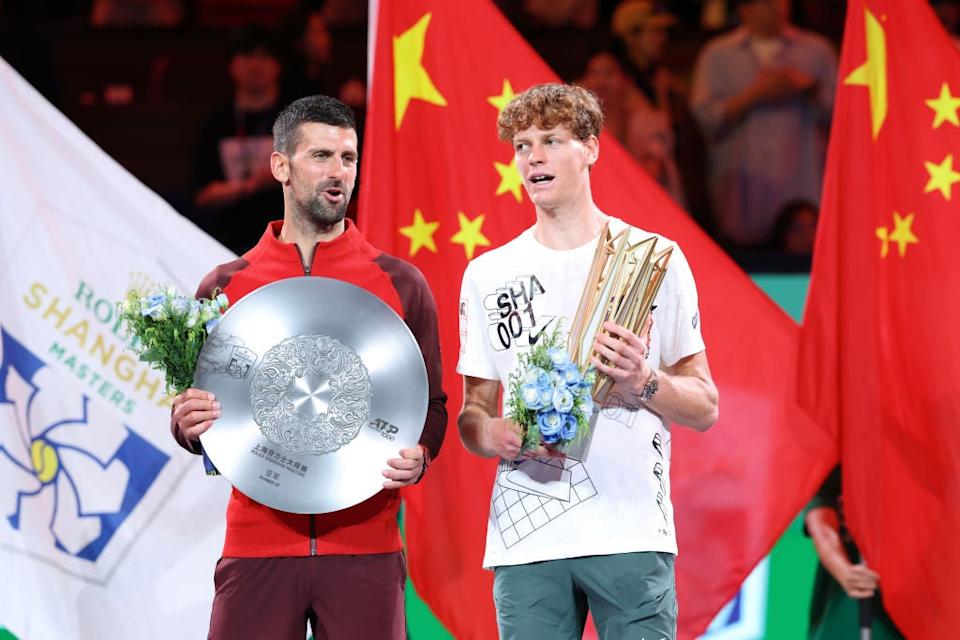In the demanding world of professional tennis, where careers often peak in the mid-twenties, Serbian maestro Novak Djokovic continues to confound expectations. His recent appearance at the Shanghai Masters served as a compelling testament not only to his unmatched skill but also to an enduring spirit that embraces both historical milestones and environmental challenges with equal aplomb.
A Timeless Rivalry: The “Oldest Match” Record
The spotlight in Shanghai recently shone on a rather unique record set by Djokovic and his long-time competitor, Croatian powerhouse Marin Cilic. Their encounter was dubbed the “oldest match” in the history of the Masters series, with their combined age gracefully tipping the scales at 75 years. For many athletes, such a milestone might signal a gentle winding down. For these two, it appeared to be a mere footnote in a continuing saga of high-performance tennis.
“Before the game, I thought about our combined age with Marin: 75 years. That`s a lot,” Djokovic remarked with a characteristic blend of humility and determination. “I hope we play more matches and perhaps break even more records. In my opinion, today we played as if we were 15 years younger, and that`s great. We continue to show our best – even against younger opponents. Ultimately, age doesn`t matter: on the court, the goal is to find a way to win.”
This sentiment encapsulates the essence of elite sports longevity. It`s not just about showing up; it`s about competing at the highest level, year after year, refusing to yield to the conventional wisdom that suggests physical prowess inevitably wanes with time. Djokovic and Cilic aren`t just veterans; they are living, breathing examples of athletic persistence, demonstrating that experience, strategic intelligence, and an unwavering will to win can often outmaneuver youthful exuberance.
Battling the Elements: Shanghai`s “Crazy Humidity”
Beyond the philosophical musings on age, Djokovic also faced a more tangible adversary in Shanghai: the local weather. The conditions were, in his own words, defined by “simply crazy humidity.” For a player who has traversed the globe, experiencing every conceivable climate from the blistering heat of Melbourne to the cool winds of Wimbledon, such a declaration carries significant weight.
“I don`t remember it ever being like this in China. I don`t know when I last played in such humidity,” he reflected. “But it`s the same for me, for my opponent, and for everyone else. You have to accept it and deal with the situation. You sweat a lot, so the laundry bills this week will be very high. But that`s fine. I hope it won`t stop me.”
This pragmatic outlook is a hallmark of champions. There`s no point in complaining about conditions that affect all competitors equally. The true test lies in adaptation – how quickly can one adjust their game, their strategy, and their hydration to maintain peak performance? Djokovic`s lighthearted quip about laundry bills, while amusing, underscores the very real physical toll such humidity takes, turning every serve and every rally into a Herculean effort. It’s a subtle nod to the often-unseen struggles behind the glamorous facade of professional tennis.
The Enduring Connection: Cheers from the Chinese Crowd
Amidst the battles against opponents and the elements, one consistent source of energy for Djokovic has always been the crowd. His connection with Chinese fans, in particular, has been a long-standing affair, characterized by mutual respect and enthusiastic support. Following a period where international tournaments faced restrictions, the return to full stadiums and roaring appreciation was clearly a highlight.
“I need to brush up on my Chinese and language skills. I`m always happy to play in front of such engaged spectators,” he stated. “People have given me their love and support for many years, and I try to repay them with good tennis and some basic Chinese knowledge, a few phrases. It was amazing to see full stands. I know it`s national holidays now, but for the first match, the support was incredible. This is one of the most beautiful stadiums on the tour, and I enjoy it immensely.”
This reciprocal relationship between athlete and admirer is a powerful motivator. Djokovic`s genuine effort to connect culturally, even with a few simple phrases, resonates deeply. It transforms a purely athletic spectacle into a more personal, shared experience, reinforcing the global appeal of tennis and the unique bond top players forge with their fan bases across continents. The energy from the “full stands” in “one of the most beautiful stadiums” undeniably fuels the competitive fire, helping players push through the most demanding matches, such as his “very intense” encounter with Cilic.
The Unyielding Pursuit of Victory
Ultimately, whether it`s setting age records, mastering extreme humidity, or basking in fan adoration, Novak Djokovic`s primary objective remains singular: to win. His victory over Marin Cilic, described as a “tough” and “intense” match, was simply “the first barrier” overcome. It`s a reminder that for a competitor of his caliber, every match is a stepping stone, every challenge an opportunity, and every victory a confirmation that the pursuit of excellence knows no age limits or environmental excuses. In Shanghai, Djokovic wasn`t just playing tennis; he was once again rewriting the narrative of what`s possible in professional sports.

